[Pierre Le Roux is from South Africa and English is not his first language, we trust all FishingMagic readers will welcome him and appreciate the effort he has made in preparing this feature for the site – Ed.]
In the winter of 2011 I was invited to join South African farmer, Mauritz Koster and his kids to go on one last trip to his farm in Ndola, near the copper belt region of Zambia. Since he was selling his farm he wanted to share an African experience with his son and two daughters and being taken on as co-pilot and driving companion suited me well but a gruelling 1500 mile journey with two border posts made for a memorable trip.
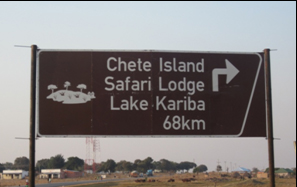 On our way up, towards Ndola, I noticed a sign pointing out, ‘Lake Kariba 68km’ and I realised just how tantalising close we were travelling to one of the most iconic lakes in the world; it just had to become part of our tour plans and it would provide the perfect stop over for us on the return leg of the journey. Travelling in Africa never really goes according to plan and having the option of fishing Kariba certainly changed the dimension of this trip.
On our way up, towards Ndola, I noticed a sign pointing out, ‘Lake Kariba 68km’ and I realised just how tantalising close we were travelling to one of the most iconic lakes in the world; it just had to become part of our tour plans and it would provide the perfect stop over for us on the return leg of the journey. Travelling in Africa never really goes according to plan and having the option of fishing Kariba certainly changed the dimension of this trip.
Taking the turn off towards Lake Kariba felt like a dream come true for me as it was somewhere I had always wanted to visit and fish but by the time we neared the lake the sun was setting fast and we had to maintain a fair speed in order to avoid night driving. After an hour, and passing several boom gates through small villages, we realised that our first ‘sight’ of the lake would actually be in darkness and our destination would only be revealed the following morning, that is if we could find the lodge!
At one point we were on the tail of what seemed to be someone who knew where he was going and certain that he was heading in the right direction we endured 20 minutes of thick dust clouds pouring from his back wheels as we kept up with him until we found our way. Strangely enough we finally got to the destination ahead of him.
Despite the time of our arrival we found that Kariba Bush Club was the perfect setting for late arrivals and after a welcome drink at the bar and a locally prepared meal of freshly caught bream and chips, we made our way to the family dorm. This accommodation is just the basics but more than enough for the travelling angler and at only $30.00 per night you can be sure of a safe and relaxing stay.
This is malaria country though and even when mosquitoes are less active in the colder winter months it is still best to take precautions, especially during night. Most lodges around the lake provide mosquito nets and sleeping with the lights out lowers the risks too.
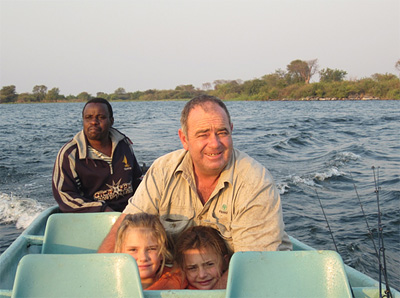 The next morning the boat we had arranged for a day’s fishing on the lake was ready to go. For $70 basic rods and reels are provided along with a packed lunch and drinks, but if at all possible it’s best to take your own tackle. You can go out on your own but the local skippers will take you almost anywhere you want within a radius of ten miles off shore and their local knowledge of the waters is excellent and this certainly helps to increase your chances of hooking up with a decent tiger or some bream.
The next morning the boat we had arranged for a day’s fishing on the lake was ready to go. For $70 basic rods and reels are provided along with a packed lunch and drinks, but if at all possible it’s best to take your own tackle. You can go out on your own but the local skippers will take you almost anywhere you want within a radius of ten miles off shore and their local knowledge of the waters is excellent and this certainly helps to increase your chances of hooking up with a decent tiger or some bream.
As far as finding the fish to put the scale of the task into perspective Kariba is on the border of Zambia and Zimbabwe and is the world’s largest manmade lake. It was formed by damming the River Zambezi and flooding the Kariba Gorge between 1958 and 1963; it is over 140 miles long and up to 20 miles wide and covers an area of over 2000 square miles with an average dept approaching 100ft. Now that’s a lot of water!
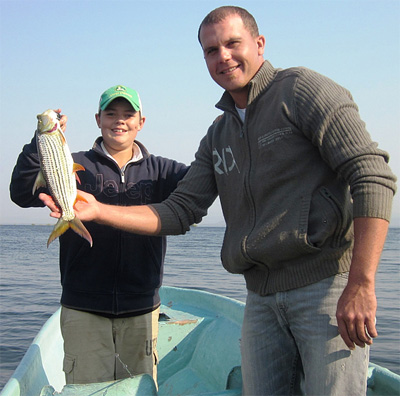 My plan of attack was to stick with one kind of lure for the day but it soon became clear that landing anything was going to prove difficult as winter is not the ideal time of year to catch tiger fish. It was really hard working the lures constantly but we kept at it; the girls, both only 11 years old, took a great interest and showed a lot of enthusiasm but it was Maurtiz’s son Zandre who proved to be the star angler as he was the first to hook into a fish and after a great fight he landed his first ever tiger fish! This sparked a ‘fever’ of activity on the boat, everyone wanted to catch a “tiger” now and the sound of sweeping rods against the thin, cool air echoed across the water.
My plan of attack was to stick with one kind of lure for the day but it soon became clear that landing anything was going to prove difficult as winter is not the ideal time of year to catch tiger fish. It was really hard working the lures constantly but we kept at it; the girls, both only 11 years old, took a great interest and showed a lot of enthusiasm but it was Maurtiz’s son Zandre who proved to be the star angler as he was the first to hook into a fish and after a great fight he landed his first ever tiger fish! This sparked a ‘fever’ of activity on the boat, everyone wanted to catch a “tiger” now and the sound of sweeping rods against the thin, cool air echoed across the water.
Conditions on the day were quite blustery but we found a more sheltered stretch of water between two small islands and as the sun finally started warming our faces Zandre landed another tiger. The grin on his face spoke a thousand words as me, his dad and his sisters became more and more despondent by the lack of action to our rods.
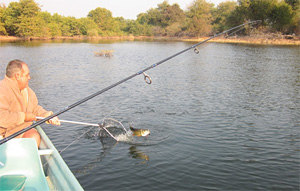
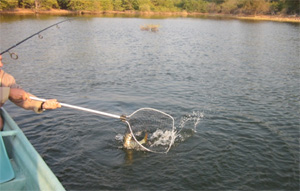
In all fairness Mauritz had little time to fish himself as most of his time was spent attending to the girls who were not as experienced as the rest of us and there were rather a lot of tangled line and ‘lures behaving badly’. Whilst all of this was going on Zandre and me could enjoy 180 degrees of open water standing on the front of the boat.
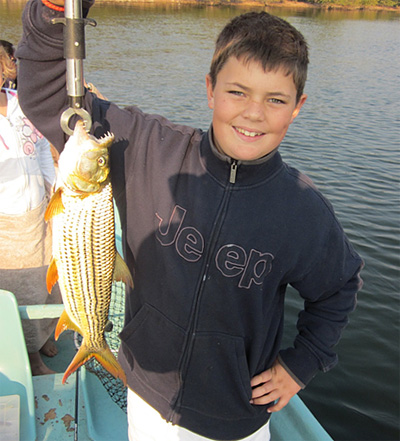 Zandre tortured us with yet another fish: this one breaking the surface as his rod bowed like a slave in front of a king. His dad almost lost this one while netting but cool headed Zandre guided the fish away from the boat and dad managed to get it in the net at the second attempt; by which time the girls started to give up and opened the cooler for sandwiches and cold drinks.
Zandre tortured us with yet another fish: this one breaking the surface as his rod bowed like a slave in front of a king. His dad almost lost this one while netting but cool headed Zandre guided the fish away from the boat and dad managed to get it in the net at the second attempt; by which time the girls started to give up and opened the cooler for sandwiches and cold drinks.
We enjoyed the surroundings and witnessed several wild animals on the islands scattered across the lake and the occasional sound of a fish eagle reminded me that this is Africa, wild and untamed and the green depths of an eerie mass of water made me wonder what on earth might be swimming beneath us. And talking of what might be swimming beneath us it’s believed that if all the crocs in Lake Kariba could be laid out there would be enough to stretch the entire perimeter of the lake! Not the kind of water to be swimming in.
Later that day, heading back towards camp, we stopped for the final time behind a small patch of reeds, anchoring the boat with a rope to a tree branch. This was my last chance to connect with something and I kept shooting my lure on the same spot into the deeper water away from the reeds. Finally I felt my line tighten up, as if I had hooked into a rock on the bottom, but then it took off…
Even the smallest fish will give you a fair fight and get your adrenalin pumping, and it is very easy to lose fish in these waters but I landed an average sized bream and was reprieved from going home empty handed. But the best was to come: I managed to catch two more bream and, although smaller than what I wished for, my first ever tiger fish too!
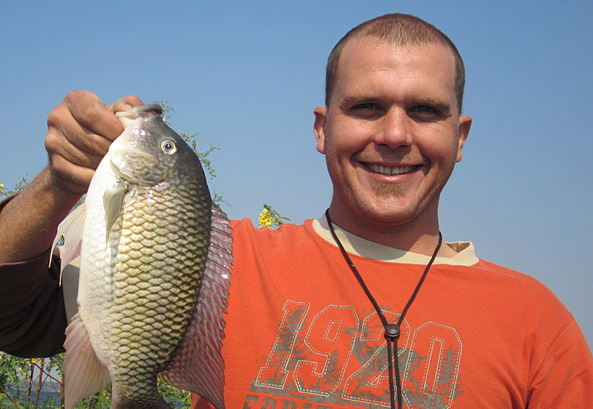
Poor dad had to be happy with experiencing the lake with his children and although he didn’t catch he enjoyed sitting back enjoying a cool Mossi lager (a local brewed beer) as we returned to land.
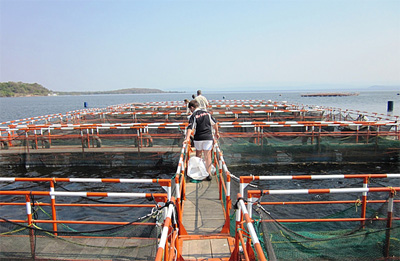 With some spare time left as we were getting close to shore the friendly skipper took us around the boats which were used at night to net a small fish called kapenta. This is in fact the protein food for most of Africa and netting is done on a large scale in Lake Kariba…too large!
With some spare time left as we were getting close to shore the friendly skipper took us around the boats which were used at night to net a small fish called kapenta. This is in fact the protein food for most of Africa and netting is done on a large scale in Lake Kariba…too large!
Local residents at the lodge told us of the negative effects overfishing is having on the lake and the problem is difficult to regulate since the border between Zimbabwe and Zambia runs through the middle of the lake. We were told that in the past ten years fish stocks have declined rapidly and the method of fishing not only target kapenta but it also effects young tiger fish which are also caught in the nets; as a consequence every year the tiger fishing results show fewer, and smaller, fish, although monster specimens undoubtedly still exist in the depths of such a massive expanse of water.
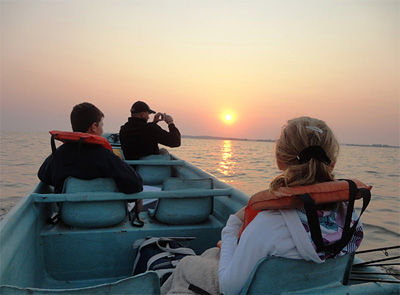 Privately owned land around the lake, like Kariba Busch Club, does provide a sanctuary for fish and unauthorised kapenta fishing boats are banned from these parts of the lake and to lessen the impact on wild populations fish farming is beginning to be undertaken. We visited a massive floating fish farm where three layers of net are used with empty barrels keeping it afloat. The top nets prevent young fish being snatched from the air by predatory birds and at the bottom thicker net keeps them safe from larger feeding fish. I was amazed by this kind of conservation and couldn’t help but hope for more fish farms being introduced in the future.
Privately owned land around the lake, like Kariba Busch Club, does provide a sanctuary for fish and unauthorised kapenta fishing boats are banned from these parts of the lake and to lessen the impact on wild populations fish farming is beginning to be undertaken. We visited a massive floating fish farm where three layers of net are used with empty barrels keeping it afloat. The top nets prevent young fish being snatched from the air by predatory birds and at the bottom thicker net keeps them safe from larger feeding fish. I was amazed by this kind of conservation and couldn’t help but hope for more fish farms being introduced in the future.
As the sun set we gazed over the massive man made wonder and I found myself thinking of all the mysteries, monstrous tiger fish and local beliefs surrounding the great waters of Lake Kariba and all of us were left with the feeling of one day returning and having a go at catching that big one!










